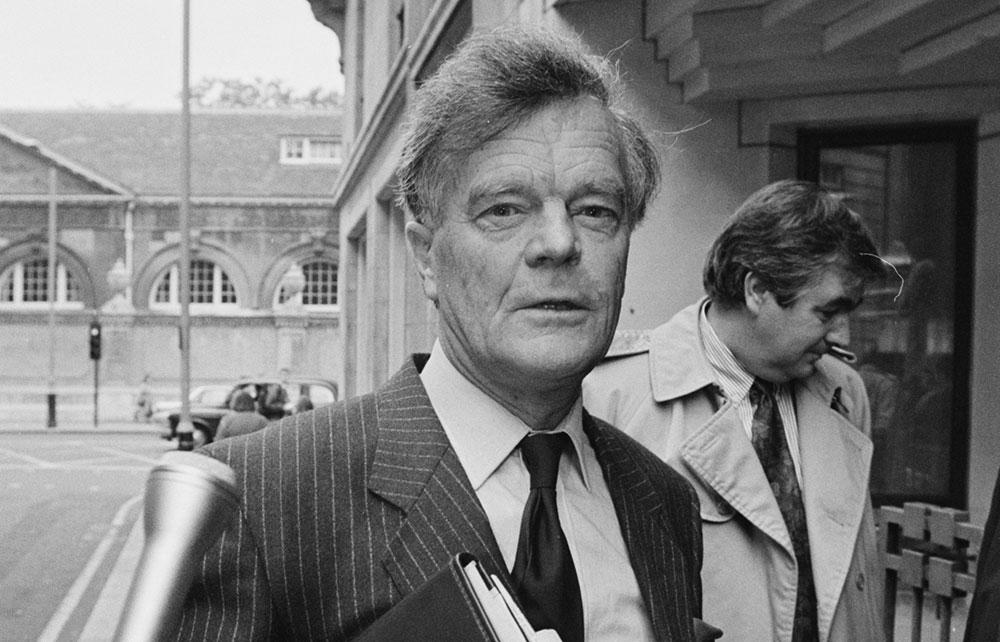Où sont les bouteilles d’antan? For that matter, où sont les amis with whom one consumed them? These autumnally melancholic musings arose because a young friend asked me about Alan Clark. He had been reading the Diaries. Were they truthful? Was Alan really such a remarkable character? The answer was simple. An emphatic yes, on both counts. I suspect that I speak for most of his muckers when I declare that I have never met anyone who was more fun.
The 1967 Yquem tasted like a Greek temple melted down in honey. Alan served it as a house wine
If Alan was of the company, the conversation might well have a whiff of sulphur. But one could rely on spice and scintillation. Alan’s very walk presaged mischief. He had a way of swivelling from the hip, like a naval gun crew trying to identify a target. That did not imply malice. Alan enjoyed wit among equals.
But in all this, there was a paradox. Alan owed his promotion, and his protection, to a most formidable – and one might have thought improbable – patroness. Margaret Thatcher was a grocer’s daughter from a Methodist background. No libertarian, she believed people should be free – to do what they ought to do. Nor was she notorious for her sense of humour. But she did enjoy dashing characters who would cheer her up and always offer her a tribute of gallantry. That came naturally to Alan. He always referred to her as ‘The Lady’ and his esteem came close to idolatry, while, in the greyness of Whitehall office routine, she was amused by his plumage.
Not many prime ministers would have bought his act, and there was another respect in which he was fortunate. When he was a minister, political correctness had not yet been invented. There was the famous occasion when he was informed that various immigrant groups objected to giving the authorities their personal details. ‘You mean to say… they’re afraid that we’ll send them back to bongo-bongo land,’ was his verdict.
But this was all japery and badinage. Or was it? Alan liked to shock. As a small boy, and if he had evaded his nanny, he would have been delighted to shove firecrackers through old ladies’ letter boxes. ‘Epater les Bourgeois’ could have been a Clark motto. But if you really want to do that, anti-Semitism is a powerful piece of verbal artillery. Alan deployed it. I never took this seriously. ‘Alan will be Alan’ was my judgment, and, to be fair, he was always warm in his dealings with Michael Howard or David Young. But my late and forever missed friend Frank Johnson remained immovable. He insisted Alan really was an anti-Semite. I can only say that I hope not.
I trust my deaf ear was not over-influenced by Alan’s hospitality, which was Maecenean in its generosity. He lived in Saltwood Castle, a magnificent border castle on the Kent coast: an entirely appropriate dwelling, with a cellar to match. One superb specimen stands out. The 1967 Yquem is one of the greatest wines I have ever drunk. It tasted like a Greek temple melted down in honey. Virgil or Horace should have written verses for the label. It deserved the genius of a laudator temporis acti at the top of his form. Alan served it as virtually a house wine.
He did the same with Château Palmer 1961, a wine with an enormous reputation, something I have never understood. To me, it seemed a jolly decent drop of claret, but not to be ranked with the first growths, as it often is.

The wines of yesteryear reminded me of the first time I drank a mighty ’61. That was a Château Montrose, tasted circa 1969. It would be absurd to claim a taste-bud memory but I remember it being very good indeed. The other day, I was treated to a ’14, which was barely ready. Those Saint-Estephes are long-lived. That is one aspect of wine’s pleasures. Past and present meld together.







Comments